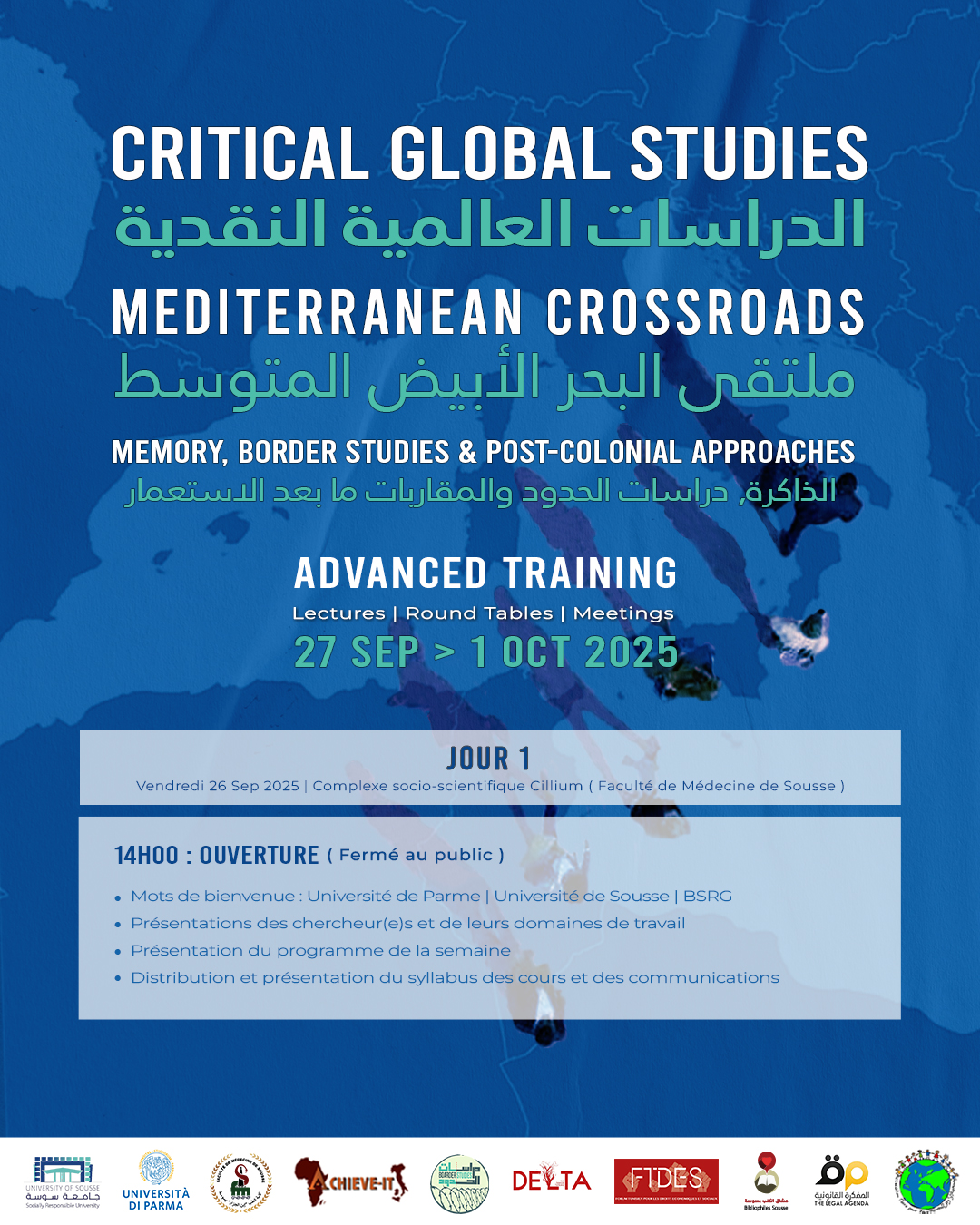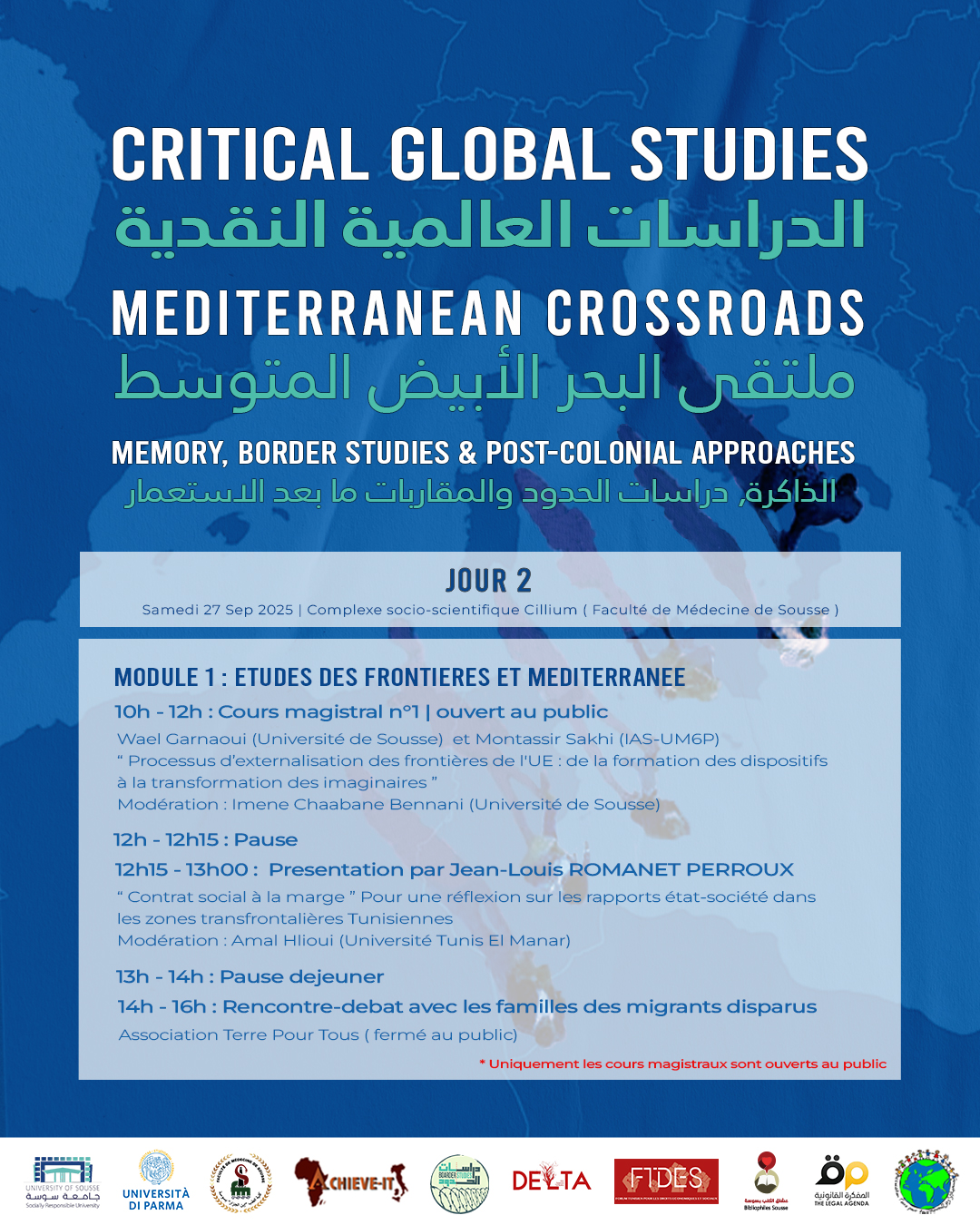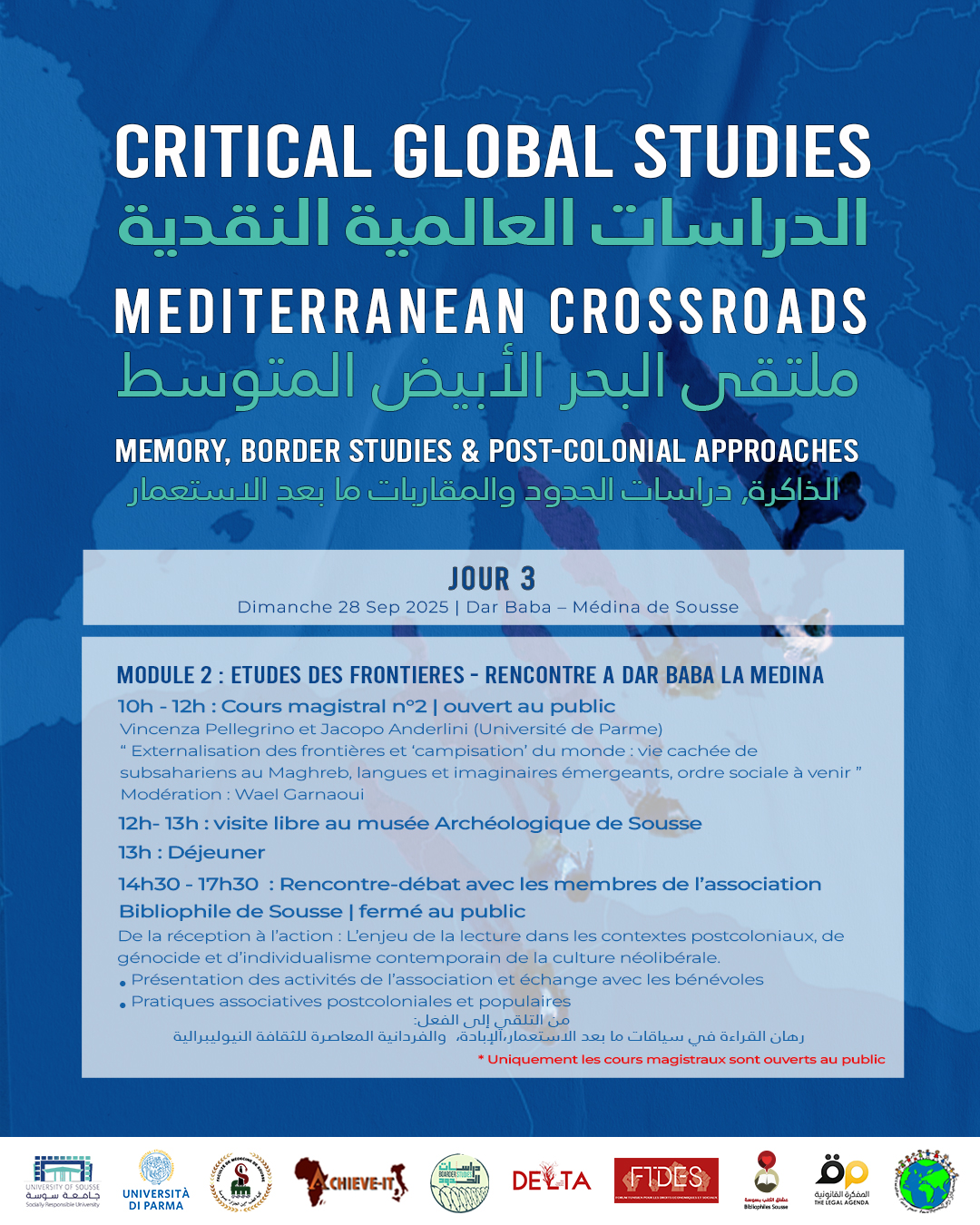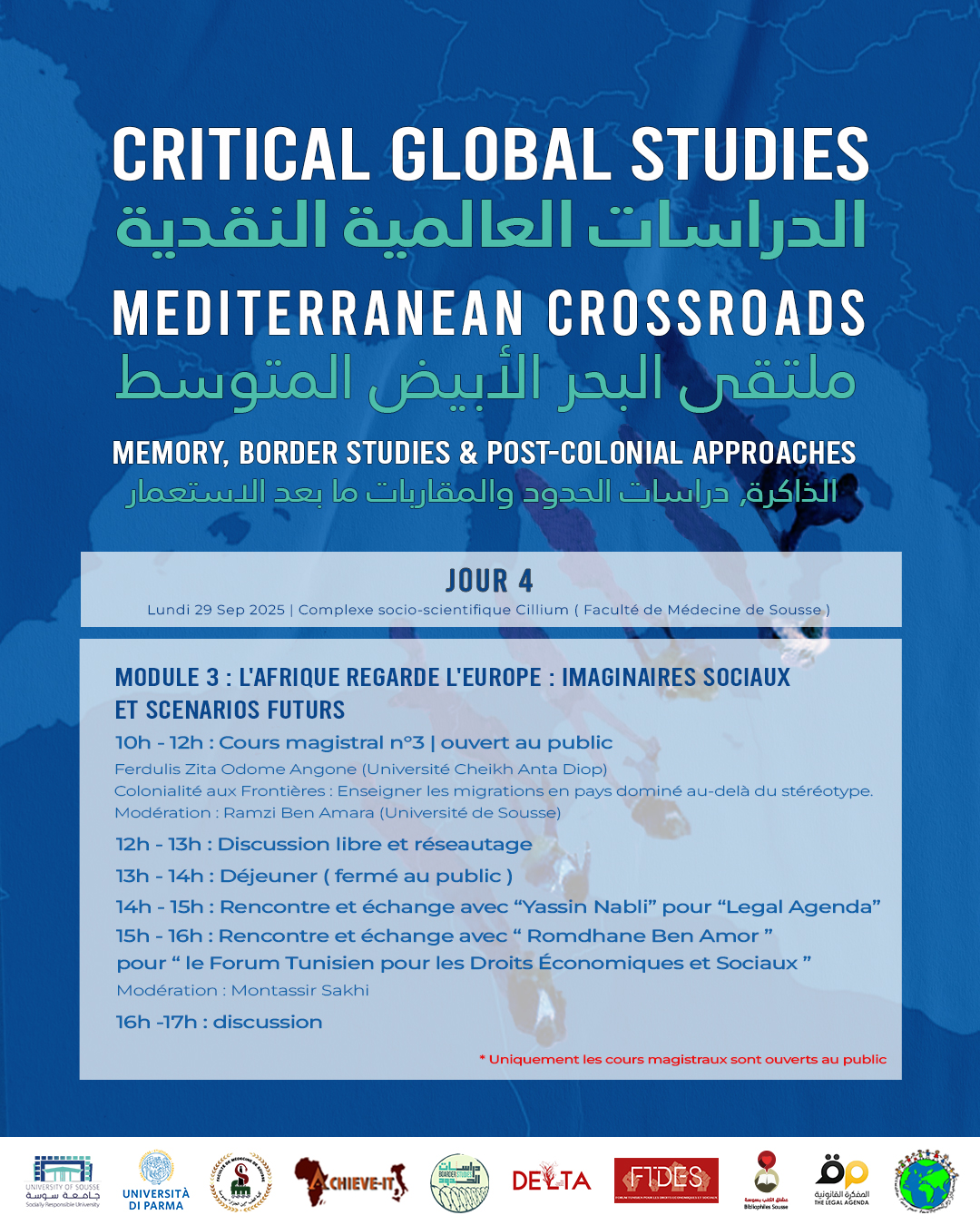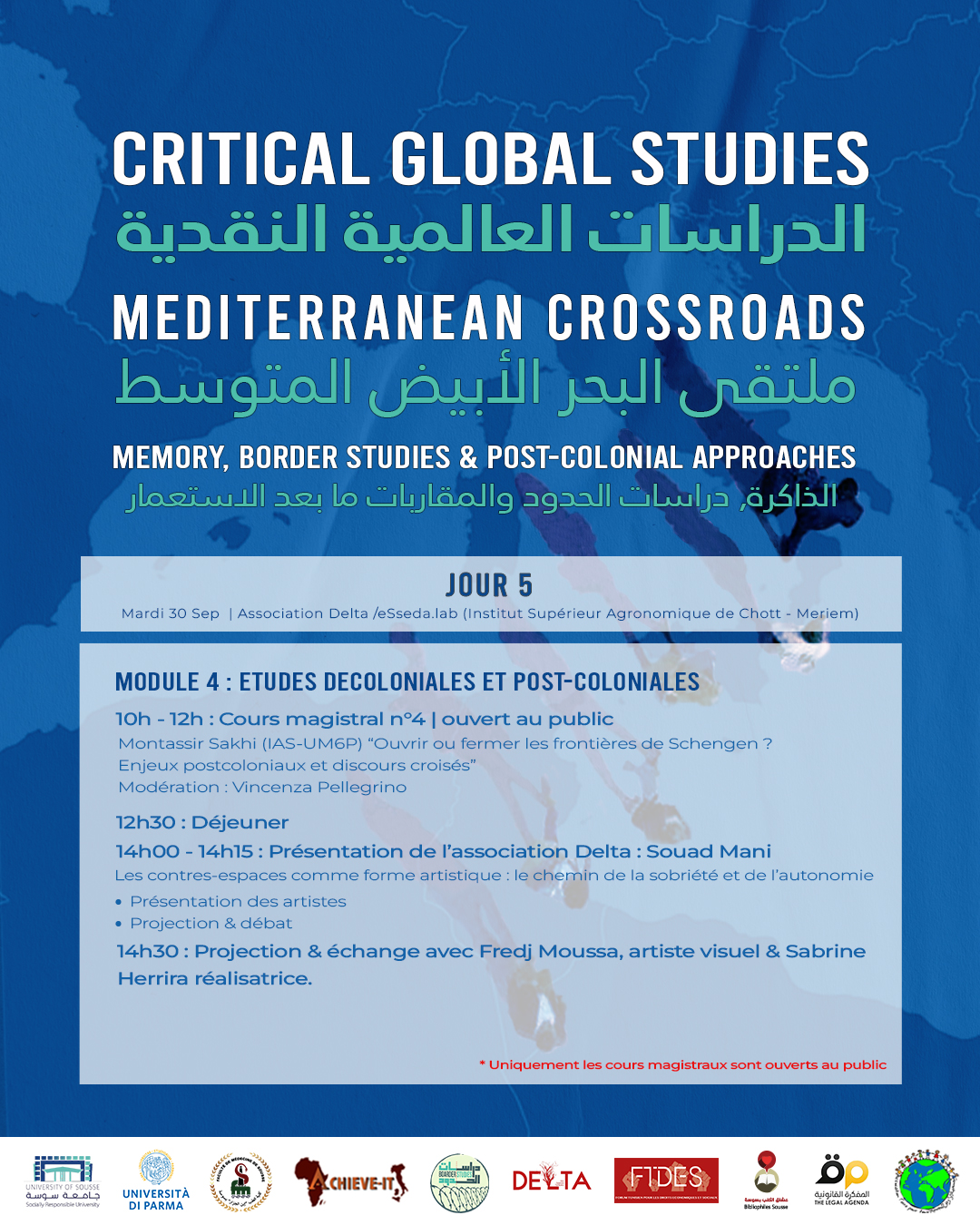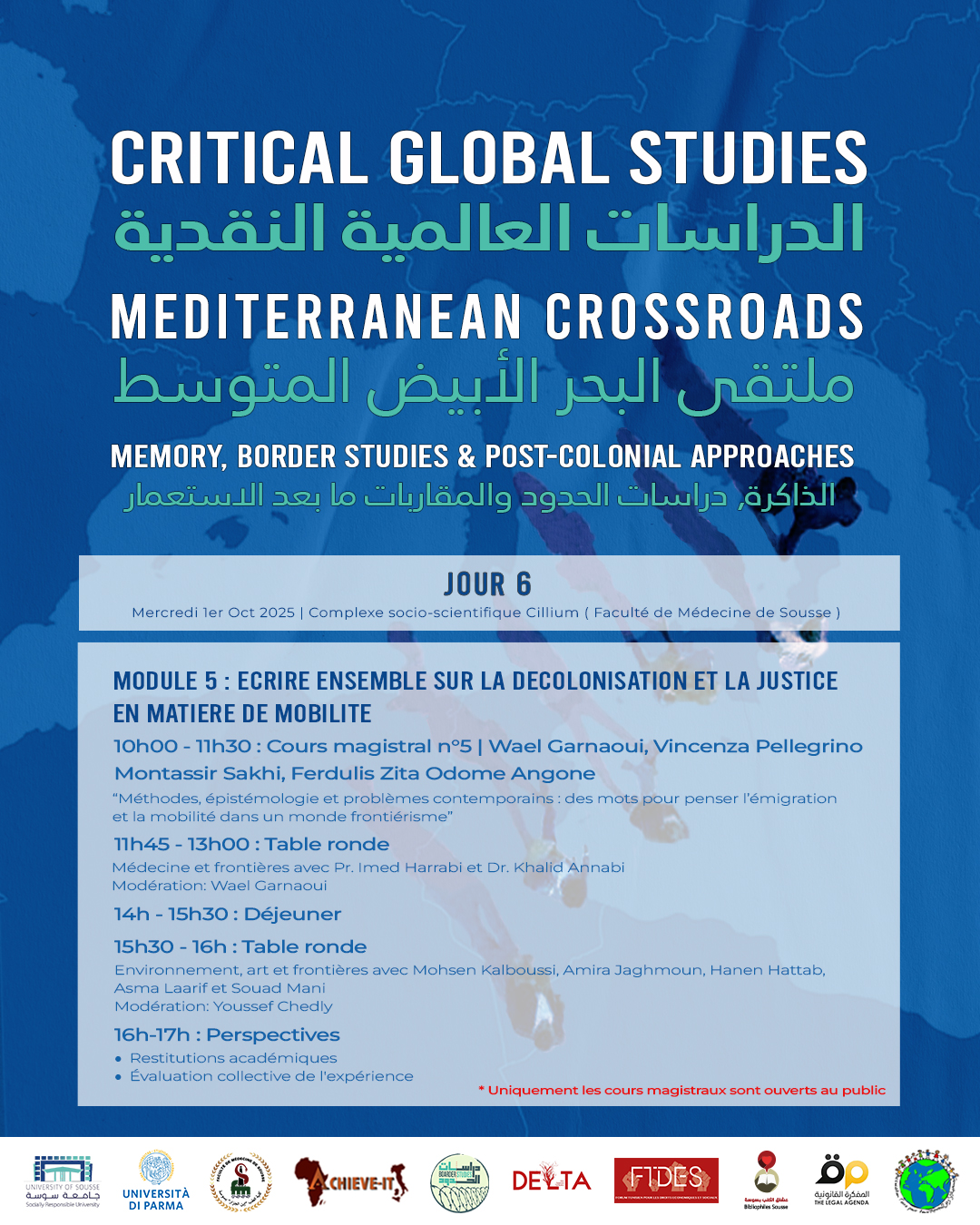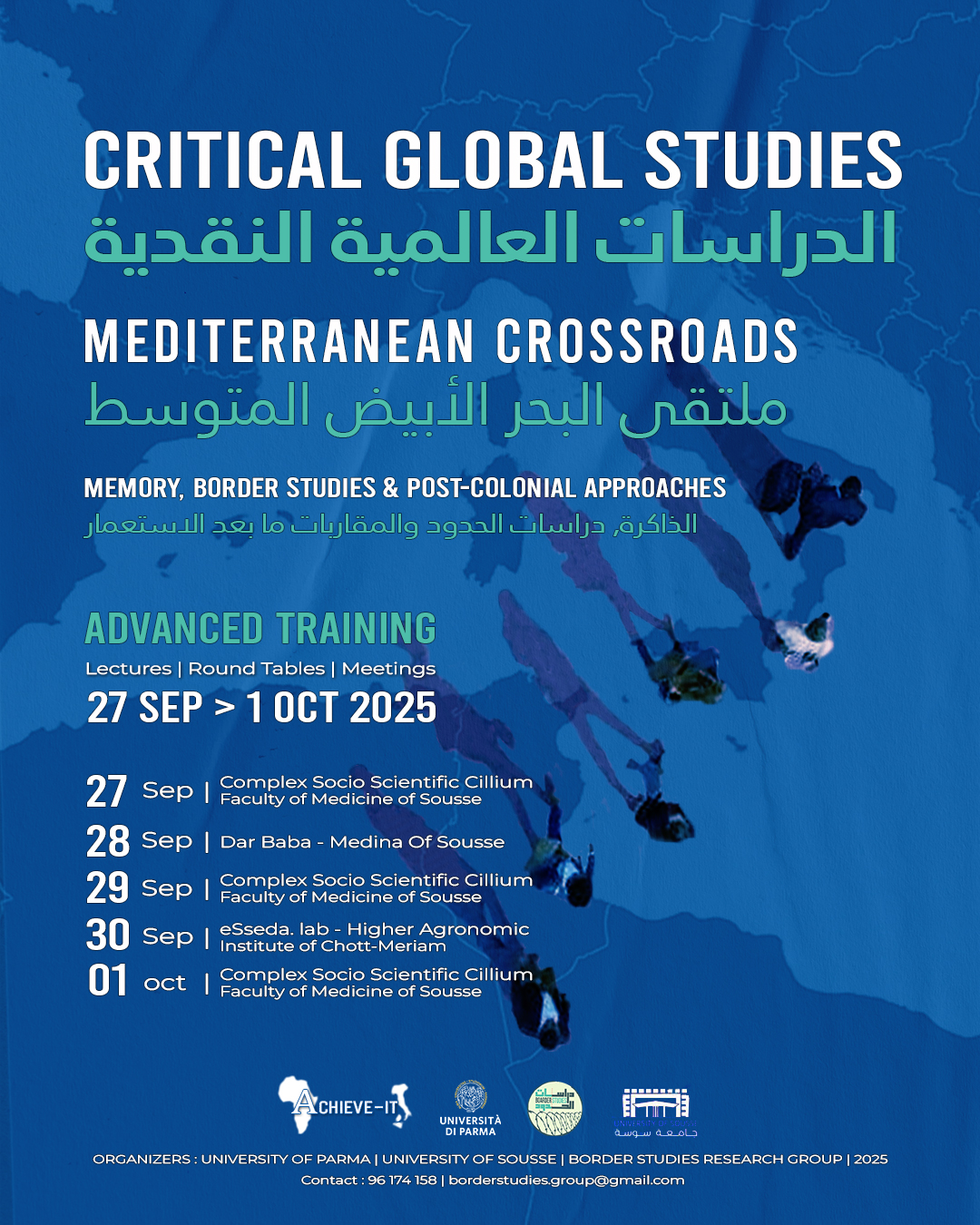
Advanced Training - Critical Global Studies: Mediterranean Crossroads
Table of Contents
“Critical Global Studies - Mediterranean Crossroads: Border Studies, Memory, and Post-Colonial Approaches”
UNIVERSITY OF PARMA – UNIVERSITY OF SOUSSE
ACHIEVE-IT Project (Academic Collaboration through Higher International Education for a Viable and Equitable Africa with Italy) Erasmus + \ PNRR
GENERAL COURSE STRUCTURE
Educational Objectives
The course aims to:
- Develop a critical understanding of the dynamics that cross the Mediterranean space starting from interconnected and non-Eurocentric interpretative lenses
- Co-construct a shared vocabulary on the themes of borders, memory and post-colonial approaches and on the links between decolonization and mobility justice
- Create a transnational research network that reflects on contemporary forms of mobility in the Mediterranean from a post-colonial perspective
- Produce a collective publication (dictionary/counter-dictionary) as a tangible output
Thematic Modules
Module 1: Border Studies and the Mediterranean
- Dynamics and functionalities of borders in the Mediterranean context
- EU border externalization processes and policies
- Analysis of migration routes
- Dimensions of solidarity
- Practical case studies with local organizations
Module 2: Memory Studies
- Contrasting narratives on migration in the Mediterranean: institutional, media and popular perspectives
- Struggles to gain voice and recognition, analysis of silenced narratives. Networks of families and associations of disappeared people in the Mediterranean
- Forensic medicine and work for/on memory
- Collaborative work with organizations dealing with memory and support groups
Module 3: Post-Colonial Studies
- Contemporary manifestations of colonial legacy: desire, power and subaltern conditions
- Subaltern perspectives on history and knowledge production
- African authors and post-colonial approaches from participants’ countries of origin
- The Southern Italian question from a post-colonial perspective
- Decolonial approaches from participants’ countries of origin
Module 4: Post-Colonial Imaginaries on the Future of EuroAfrica
- Representations of the future, performing arts, new youth cultures
- Critical and alternative development models
- Visions regarding mobility justice and future possibilities
- The Mediterranean as an ecological issue
Teaching Methodology
- 33% Theoretical lectures: Masterclasses and guided debates
- 33% Interactive workshops: Case analysis, group work, practical exercises
- 33% Field experiences: Meetings with local organizations, activists and artists
DETAILED PROGRAM
FRIDAY SEPTEMBER 26, 2025 – DAY 0
14:00 | Opening
- Presentations. Each participant presents their field of work
- First informal meeting between participants and organizers
- Presentation of the week’s program
- Distribution of welcome kit with course materials
20:30 | Informal welcome dinner
SATURDAY SEPTEMBER 27, 2025 - DAY 1
Module 1: Border Studies
10:00-10:30 | Institutional greetings
- Greetings from the University of Sousse representative
- Presentation of the ACHIEVE-IT project
- Course objectives and methodology
10:30 | Masterclasses: “Mediterranean borders: material dynamics and imaginaries”
- The Mediterranean as a stratified border space
- Historical evolution of border regimes
- Tunisia as a case study
- Debate
15:00 Panel Discussion: “EU border externalization processes”
- Brief presentations (15 min) by 3 participants on their national contexts
- Comparative analysis of migration policies
- Debate
17:30 | Workshop: Analysis of migration routes
- What do we mean by “routes”? Participatory mapping
- Analysis of involved actors
- Dimensions of transnational solidarity
- Focus on terminology related to Border studies
- Collective elaboration of definitions
- Integration with the first 5 words
Evening | Dinner with Special event: Film/documentary screening
- Viewing of a documentary on Mediterranean migrations
- Discussion with the director (if available) or guided debate
SUNDAY SEPTEMBER 28, 2025 - DAY 2
Module 2: Memory Studies
9:30 | Masterclasses: “Contested narratives on/in the Mediterranean”
- Institutional narratives vs. grassroots narratives
- The role of media in memory construction
- Silences and oblivion in memory policies
- Debate
12:30 | First Meeting with associations dealing with migrants’ rights
- Intervention by representatives of families of the disappeared associations
- Resistance and claim strategies
- Participatory discussion
- Lunch together
15:30 | Workshop: Collective memory practices with associations
- Biographical and collective memory exercises
- Oral story collection techniques
- Construction of counter-narratives
- Focus on concepts related to memory and testimony
20:30 | Activities with associations
MONDAY SEPTEMBER 29, 2025 - DAY 3
Module 3: Post-Colonial Studies
9:30 | Masterclasses: “Colonial legacies in the present Mediterranean”
- Contemporary manifestations of the colonial
- Decolonization of knowledge and practices
- Africa and decolonial approaches
- Case studies
- Debate
14:30 | Field visits - Accompanists: Teachers + Local guides
Parallel options:
Visit to Association for migrants’ rights
- Meeting with operators and hosted people
- Participant observation of activities
Visit to Cultural/artistic center
- Meeting with artists working on migration themes
- Creative workshop
Visit to Grassroots organization
- Dialogue with local activists
- Participation in community activities
20:30 | Dinner and collective sharing of experiences lived during the day
- Discussion on observations made and critical reflections on observed practices, in connection with theoretical modules
- Artistic presentation on course themes
- Dialogue with local artists and performers
TUESDAY SEPTEMBER 30 - DAY 4
Module 4: Africa looks at Europe: social imaginaries and future scenarios
9:30 | Masterclasses: “What scenarios open up? How to imagine the future of mobility starting from Africa’s future?”
- Africa and decolonial approaches
- Youth cultures and visions of the future
- Feminist approaches to mobility justice
- The ecological question
- Case studies
15:30 | Workshop: Thinking a Counter-dictionary “Decolonizing Mediterranean Crossroads” Facilitators: All teachers
- Which words cannot be missing?
- Writing exercises
- Identification of possible publishers/platforms
Evening with associations
WEDNESDAY OCTOBER 1 - DAY 5
Module 5: Writing together on decolonization and mobility justice
9:30 | Round Table: “Decolonial perspectives from contexts of origin”
- Participants’ interventions
- Focus on African approaches and authors
- Construction of shared bibliographies
- Connection with CPCL journal (European Journal of Creative Practices in Cities and Landscapes)
- Proposal for a monographic issue
15:30 | Experience sharing session
- Collective evaluation of the experience
- Proposals for future collaborations
- Delivery of participation certificates
- Concluding interventions by teachers
Celebration evening with associations: Closure
THURSDAY OCTOBER 2, 2025 - DEPARTURE
Check-out and staggered departures
TEACHERS AND PARTICIPANTS
Main Teachers – Scientific Committee
- Prof. Vincenza Pellegrino (University of Parma) - Sociology of migrations, post-colonial studies, participatory methodologies
- Prof. Wael Garnaoui (University of Sousse) - Mediterranean studies and collective memory
- Dr. Jacopo Anderlini (University of Parma) - Border studies and participatory methodologies
Organizational and logistical support committee:
- Dr. Youssef Chedly (Université de Sousse)
- Mayssa Joabli (Université de Sousse)
Participating researchers:
- Montassir Sakhi (Institute for Advanced Studies Ben Guerir\Morocco)
- Ferdulis Zita Odome Angone (Cheikh Anta Diop University)
- Amal Hlioui (Université Tunis El Manar)
- Imene Chaabane Bennani (Université de Sousse)
- Hanen Hattab (Université de Sousse)
- Amira Jaghmoun (Université de Sousse, Université de Monastir)
- Ramzi Ben Amara (Université de Sousse)
- Souad Mani (Université de Sousse)
- Mohsen Kalboussi (Université de Tunis)
- Imed Harrabi (Université de Sousse)
- Asma Laarif (Université de Sousse)
- Khaled Annabi (Université de Sousse)
Auditing students:
- Beatrice Todaro (University of Milan, University of Parma)
- Luana Roman Atiencia (University of Parma)
Other names being defined
Involved associations
- FTDES: Romdhan Ben Amor
- Légal Agenda: Yassine Nabli/Olfa Lamloum
- Avocats sans frontières: Nawres Douzi
- Terre pour tous Imed Soltani: families of the disappeared
- Ridha Tlili (film / water/Gafsa)
- Nomad 08
- Habib Ayeb
MATERIALS AND OUTPUTS
Required teaching materials
Each researcher must send before the course (2 weeks before):
- Essential readings dossier (max 2 texts/articles per researcher)
- Self-presentation sheet (to be shared)
- Personal bibliography (indicate 5 authors/reference texts in their field of research)
- Preliminary glossary (key terms that would be discussed)
Expected outputs
Immediate
- 15 collectively defined keywords
- Network of 10-12 active researchers
- Audio-visual materials from sessions
- Evaluation report
Medium term (6 months)
- Publication of Dictionary/Counter-dictionary
- At least 2 joint research project proposals
- Co-authored scientific articles
Long term (12-18 months)
- Consolidation of research network
- New institutional collaborations
- Replication of training model in other contexts
METHODOLOGICAL NOTES
Pedagogical Approach
- Participatory learning and co-construction of knowledge through valorization of participants’ experiences, particularly their field research work
- Continuous documentation with (consensual) recording of sessions for collective memory
Management of Linguistic Diversity
- Informal peer translations during workshops
- Multilingual synthesis of key points
- Mutual linguistic support in working groups
ACHIEVE-IT Project (Academic Collaboration through Higher International Education for a Viable and Equitable Africa with Italy) Erasmus + \ PNRR
